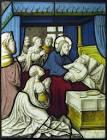
Jesus gave help to all kinds of people. Jairus was a synagogue official, so he was probably an important person. Unlike the Pharisees he had respect for Jesus and fell at His feet. As a father he was desperate to save his little girl. In telling this story, Mark inserts another one into his narrative. Unlike Jairus, the woman with the haemorrhage would have been an outcast, as it would have made her unclean. In fact there are parallels between the two women; Jairus’s daughter, being dead, would also have been unclean. Moreover, the number twelve connects the two; the woman had suffered her complaint for twelve years and the child was twelve years old. In touching them, which he did on both occasions, Jesus himself would have been made unclean. However love and care came first for the Lord, which the Law was meant to do anyway. It was designed to provide a way of living a harmonious life, honouring God and neighbour, not a means to allow individuals to parade their virtue by rigidly adhering to regulations.
Since he was on his way to heal the official’s daughter, he might well have ignored the woman who had touched His cloak. She was healed of her illness and could have crept away unnoticed. Jairus would have been getting frantic at the delay. Jesus however wanted to acknowledge the faith of the woman. When he affirmed her in this way, she must have felt that a whole new life was opening up before her. She was whole again.
Sometimes God takes a long time to respond to our prayers. Very often, with hindsight, we can see how his timing was so much better than ours. Jairus did not have to worry. He trusted in Jesus and all was well: his little daughter was restored to him in full health.